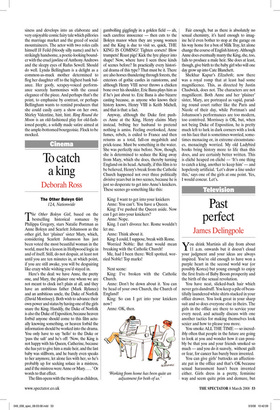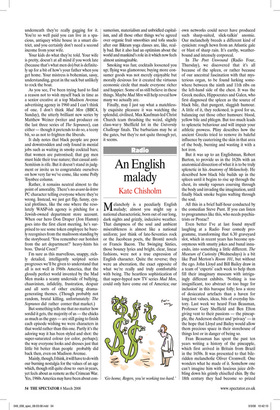Past perfect
James Delingpole
You drink Martinis all day from about 11 a.m. onwards but it doesn’t cloud your judgment and your ideas are always inspired. You’re old enough to have won a purple heart in the second world war (or possibly Korea) but young enough to enjoy the first fruits of Baby Boom prosperity and the birth of the sexual revolution.
You have neat, slicked-back hair which never gets dandruff. You keep a pile of beautifully laundered white shirts stacked in your office drawer. You look great in your sharp suit and so does everyone else in theirs. The girls in the office are there to service your every need, and actually discuss with one another tactics for making themselves look sexier and how to please you more.
You smoke ALL THE TIME — so incredibly often that people in the future are going to look at you and wonder how it can possibly be that you and your friends smoked so much — and you do it suavely, without guilt or fear, for cancer has barely been invented.
You can give girls’ buttocks an affectionate pat in the office and that’s OK because sexual harassment hasn’t been invented either. Girls dress in a pretty, feminine way and seem quite prim and demure, but underneath they’re really gagging for it. You’re so well paid you can live in a spacious, antiquey white house in a smart district, and you certainly don’t need a second income from your wife.
Your kids do what they’re told. Your wife is pretty, doesn’t at all mind if you work late (because that’s what men do) but is definitely up for a bit of how’s your father when you get home. Your mistress is bohemian, sassy, understanding, great in the sack but unlikely to rock the boat.
As you see, I’ve been trying hard to find a reason not to wish myself back in time as a senior creative at a top Madison Avenue advertising agency in 1960 and I can’t think of one. I don’t think Mad Men (BBC4, Sunday), the utterly brilliant new series by Matthew Weiner (writer and producer on the last three series of The Sopranos), can either — though it pretends to do so, a teeny bit, so as not to frighten the liberals.
It duly notes that black people are poor and downtrodden and only found in menial jobs such as waiting in smoky cocktail bars; that women are patronised; that gay men must hide their true nature; that casual antiSemitism is rife. But it doesn’t stand in judgment or invite us to congratulate ourselves on how very far we’ve come, like some Polly Toynbee column.
Rather, it remains neutral almost to the point of amorality. There’s no avant-la-lettre PC character telling everyone where they’re wrong. Instead, we just get flip, funny, cynical plotlines, like the one where the resolutely WASP-ish agency is pitching for a Jewish-owned department store account. When our hero Don Draper (Jon Hamm) goes into the first client meeting, he’s surprised to see some token employee he barely recognises from the mailroom standing by the storyboard. ‘You remember our hotshot from the art department?’ heavy-hints his boss. ‘David Coen?’ I’m sure as this marvellous, snappy, richly detailed, intelligently scripted series progresses we’ll be given to understand that all is not well in 1960s America, that the glossily perfect world invented by the Mad Men masks a seamy underside of bullying, chauvinism, infidelity, frustration, despair and all sorts of other exciting dramagenerating themes. (Though probably not random, brutal killing, unfortunately: The Sopranos did rather corner that market.) But something tells me that no matter how sordid it gets, the majority of us — the chicks as much as the guys — are still going to finish each episode wishing we were characters in that world rather than this one. Partly it’s the adoring way it has been styled and shot: the super-saturated colour (or color, perhaps); the way everyone looks and dresses just that little bit better than people probably did back then, even on Madison Avenue.
Mainly, though, I think, it will have to do with our burning nostalgia for the values of an age which, though still quite close to ours in years, yet feels about as remote as the Crimean War. Yes, 1960s America may have been about con sumerism, materialism and unbridled capitalism, and all those other things we’ve agreed over organic fruit smoothies and tofu snacks after our Bikram yoga classes are, like, really bad. But it also had an optimism about the world and mankind’s role in it which now feels almost unimaginable.
Smoking was fun; cocktails loosened you up; flying was glamorous; buying more consumer goods was not merely enjoyable but morally desirous for it created the virtuous economic circle that made everyone richer and happier. Some of us still believe in these things. Maybe Mad Men will help reveal how many we actually are.
Finally, may I just say what a matchlessly exquisite pleasure it was watching the splendid, civilised, Max Kaufman-led Christ Church team thrashing the weird, slightly class-war-y Sheffield lot in the University Challenge finals. The barbarians may be at the gates, but they’re not quite through yet, it seems.



















































































 Previous page
Previous page